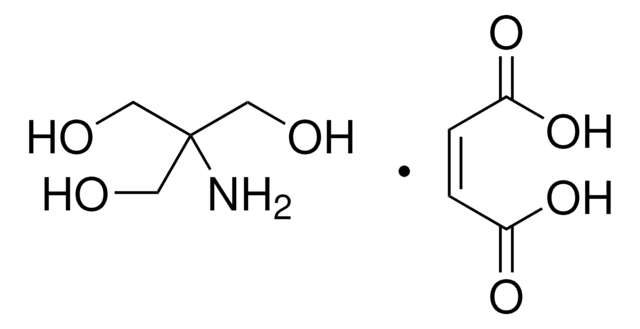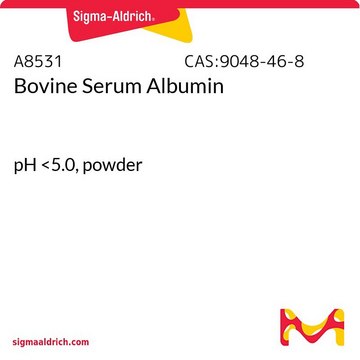A3912
Bovine Serum Albumin
heat shock fraction, pH 5.2, ≥96%
Synonym(s):
Albumin bovine serum, BSA, Bovine albumin
About This Item
Recommended Products
biological source
bovine
Quality Level
Assay
≥96%
form
lyophilized powder
mol wt
~66 kDa
purified by
heat shock fractionation
packaging
poly bottle of
origin
USA origin
technique(s)
blood typing: suitable
microbiological culture: suitable
impurities
BT and VSV virus, tested
loss
≤5%
pH
5.2
solubility
water: soluble (40 mg/ml)
UniProt accession no.
foreign activity
BT Virus, none detected
VSV Virus, none detected
storage temp.
2-8°C
Gene Information
bovine ... ALB(280717)
Looking for similar products? Visit Product Comparison Guide
General description
Application
- to study its adsorption on a planar poly(acrylic acid) (PAA) brush layer through fixed-angle optical reflectometry
- to measure its adsorption on a variety of thin films by means of total internal reflection spectroscopy
- as a constituent of Krebs-Ringer bicarbonate buffer, which acts as a perfusate during placental perfusion
Biochem/physiol Actions
Quality
Preparation Note
Storage Class Code
11 - Combustible Solids
WGK
WGK 3
Flash Point(F)
Not applicable
Flash Point(C)
Not applicable
Personal Protective Equipment
Choose from one of the most recent versions:
Certificates of Analysis (COA)
Don't see the Right Version?
If you require a particular version, you can look up a specific certificate by the Lot or Batch number.
Already Own This Product?
Find documentation for the products that you have recently purchased in the Document Library.
Customers Also Viewed
Our team of scientists has experience in all areas of research including Life Science, Material Science, Chemical Synthesis, Chromatography, Analytical and many others.
Contact Technical Service


